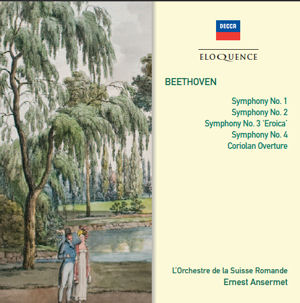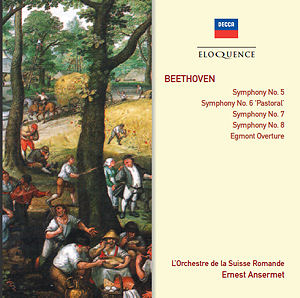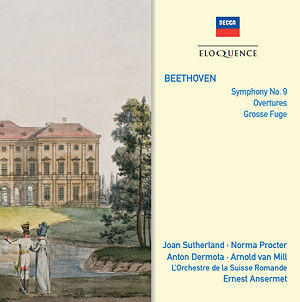 |
 |
|



Purchase from
Buywell.com
|
Ludwig van BEETHOVEN
(1770-1827)
Complete Symphonies
Volume 1
CD 1
Symphony No.1 in C, op.21 (1800) [26:54]
Symphony No.3 in E flat, Eroica, op.55 (1803) [48:05]
CD 2
Symphony No.2 in D, op.36 (1803) [33:21]
Symphony No.4 in B flat, op.60 (1806) [33:26]
Coriolan Overture, op.62 (1807) [7:06]
 L’Orchestre de
la Suisse Romande/Ernest Ansermet L’Orchestre de
la Suisse Romande/Ernest Ansermet
rec. Victoria Hall, Geneva, November 1958 (Symphony B flat and Coriolan),
January 1960 (Symphony 2), April 1960 (Symphony 3) and November 1963
(Symphony 4) ADD
 DECCA ELOQUENCE
480 0391 [75:09 + 76:12] DECCA ELOQUENCE
480 0391 [75:09 + 76:12]
Volume 2
CD 1
Symphony No.5 in C minor, op.67 (1807) [31:07]
Symphony No.6 in F, Pastoral, op.68 (1808) [40:25]
CD 2
Symphony No.7 in A, op.92 (1812) [38:52]
Symphony No.8 in F, op.93 (1812) [27:31]
Egmont Overture, op.84 (1810) [8:27]
 L’Orchestre de
la Suisse Romande/Ernest Ansermet L’Orchestre de
la Suisse Romande/Ernest Ansermet
rec. Victoria Hall, Geneva, May 1958 (Symphony 5 and Egmont), October
1959 (Symphony 6), January 1960 (Symphony 7) and November 1963 (Symphony
8) ADD
 DECCA ELOQUENCE
480 0394 [71:42 + 75:08] DECCA ELOQUENCE
480 0394 [71:42 + 75:08]
Volume 3
CD 1
Symphony No.9 in D minor, op.125 (1822/1824) [67:12]
CD 2
The Creatures of Prometheus Overture, op.43 (c 1801) [5:12]
Fidelio Overture, op.72c (1805 rev 1806) [5:51]
Leonora No.2 Overture, op.72a (1805 rev 1806) [13:44]
Leonora No.3 Overture, op.72b (1805 rev 1806) [13:47]
Grosse Fuge in B flat, op.133 (orch. Felix WEINGARTNER
(1863 - 1942)) (1825/1826) [17:05]
 Joan Sutherland (soprano);
Norma Proctor (mezzo); Anton Dermota (tenor); Arnold van Mill (bass);
Choeur du Brassus/André Charlet; Choeur des Jeunes de l’Église
National de Vandoise; L’Orchestre de la Suisse Romande/Ernest
Ansermet Joan Sutherland (soprano);
Norma Proctor (mezzo); Anton Dermota (tenor); Arnold van Mill (bass);
Choeur du Brassus/André Charlet; Choeur des Jeunes de l’Église
National de Vandoise; L’Orchestre de la Suisse Romande/Ernest
Ansermet
rec. Victoria Hall, Geneva, May 1958 (Leonora No.3), April 1959 (Symphony
9), May 1959 (Grosse Fuge) and January 1960 (Prometheus, Fidelio and
Leonora No.2) ADD
 DECCA ELOQUENCE
480 0397 [67:12 + 56:11] DECCA ELOQUENCE
480 0397 [67:12 + 56:11]  |
|
|
When I started buying LPs in the mid-1960s I was often told that
if I wanted to hear the best Debussy and Ravel I could do no better
than to get hold of the Ansermet recordings. This suited me because
I was severely limited in the folding matter department - you
don’t get very far when all you have is 12/- (60p) a week
from your newspaper round. Ansermet’s early, mono only,
recordings were re-issued on the Decca Ace of Clubs label - a
snip at 20/- (£1.00p) - and his later stereo remakes were
available on Decca’s Ace of Diamonds label - an extravagance
at £28/6d (£1.42p). However, despite the prices of
these essential LPs, I was told that good though the interpretations
were - I don’t think I need go into that statement for we
all, now, know the quality Ansermet achieved in the French repertoire,
amongst other things - the orchestra was not of the first rank.
In fact, James Reel, of the All Music Guide, recently wrote that
the orchestra “… was second-rate in tone and technique.”
A tad harsh perhaps, but it must be said that L’Orchestre
de la Suisse Romande was never going to be placed alongside the
London Symphony, nor the New York or Berlin Philharmonics as one
of the major bands of the world. But yet, under Ansermet’s
50 tenure as their chief conductor, it produced a long series
of satisfactory recordings of very varied repertoire, but I wonder
how many would think of Beethoven as a composer Ansermet would
have committed to disc? There’s a difference between what
you perform in public and what you record.
Here we have the complete Beethoven Symphonies on 6 CDs with various
Overtures as fillers and recorded between 1958 and 1963. The sound
is excellent, crisp and clear, showing a very good balance within
the orchestra, but also highlighting an occasional seediness in
the strings and souring the higher register of the oboe. On the
plus side the rest of the woodwind and the brass have a fine bloom.
When I started listening I hadn’t realized that these recordings
were made at a time before the early instrument/period
performance brigade came on the scene, so what we have here is
a set of performances based on the received understanding from
years and years of Beethoven performances, played on instruments
which may not have existed in the composer’s time, and which
are played as music for their own sake, not as museum pieces to
be treated with kid-gloves. What I am saying is that there is
little scholarship to these performances but there is a lot of
heart.
The introduction to the 1st Symphony
shows exactly what I mean about a lack of scholarship, it’s
a bit thick and treacly, but the ensuing allegro is bright
and sparkling; superbly energetic, if a touch heavy-handed. There’s
a verve to this performance and the exposition is repeated! The
slow movement is straightforward, the minuet has a very strict
tempo which is adhered to throughout, but the finale is rather
too heavy and never gets off the ground, good though it is, this
needs a lighter touch.
The 2nd Symphony starts with a
very weighty slow introduction which leads into a somewhat hard-driven,
but very persuasive, performance of the allegro. It’s
a solid performance throughout, but the finale is on the heavy
side and a trifle rushed, but Ansermet has such a vision that
he makes it work.
The Eroica, by contrast, is rather too lightly textured,
but there is a gravity, and even a nobility, to the funeral march,
however, there is a speeding up of the tempo when the double fugue
starts. This is exciting but all funereal thoughts are banished
at this point, and afterwards we never really get back to where
the music was before the fugue. It’s all quite exciting,
though, despite the piercing trumpet sounds. The scherzo has some
lovely wind playing, but the horns, in the trio, are too backwardly
balanced and the finale comes off very well because Ansermet chooses
a brisk tempo which this movement needs for it to hold together
satisfactorily.
A wonderfully paced slow introduction to No.4 bodes well
and the allegro is a gem of a performance, light and airy, the
music smiling and being as genial as it can be. The slow movement
is good but it never really relaxes for any length of time. The
scherzo is fantastic, playful and buoyant and the finale races
along, smiling away but still somewhat ponderous.
The Coriolan Overture which ends this first set, starts
off very well, then Ansermet puts his foot on the accelerator
and it’s non-stop high excitement almost all the way to
the end.
The second set begins with a storming performance of the 5th
Symphony. The first movement is all drama and fire. The second
limpid and songlike, the third starts with the most exquisite
pianissimo and the finale is all confrontation and animation.
The very things which marred the first four Symphonies are all
brought to bear here and they really work. There’s a slight
mannerism in the first movement in the use of rubato when the
famous theme re-appears but I can forgive Ansermet that. After
all, most conductors do something along these lines and, in Ansermet’s
favour, he does repeat the first movement exposition.
The Pastoral begins so quietly, compared to the end of
the Fifth which is very loud, that you’ve got to turn the
volume up to be able to hear it. This is a slightly brash performance
but with good playing and a nice sense of the peaceful; the scene
by the brook is especially lovely. Unfortunately, towards the
end the high strings have a rather unpleasant glassy sound when
playing loudly, but the coda, gentle and held back, is excellent.
The 7th Symphony is perfect in
every way. The first movement is very pleasingly dance-like, the
slow movement monolithic, with a strict adherence to tempo to
match this. The scherzo is fast and precise, the second repeat
is taken, and the trio is not held back - the tempo is perfect.
The finale is straightforward and includes the exposition repeat,
as does the first movement of No.8! The 8th
is Beethoven’s little child; it’s light and frothy,
has no pretensions to be a world-breaker, like some of its predecessors,
and is a delight. Ansermet pushes the first movement a bit too
much, and the humour is lacking. The second movement is a study
in strict playing and the third, minuet, are just about spot-on.
The finale is far too hard-driven for such a light-weight work.
However, the recording is very forward and the sound may have
something to do with what I perceive to be the severity of the
performance.
The Egmont Overture, which ends this disk, is very exciting,
even if Ansermet pulls the tempo around to suit his vision of
the piece.
The third set contains the 9th Symphony
and a handful of overtures. Perhaps surprisingly, this 9th
is the highlight of the set. Ansermet certainly understands how
this music works much better than the other works in the canon.
Starting with a brisk, but not too fast, allegro, he charts
the progress of the music clearly and precisely, allowing the
argument to unfold gradually before us, and if the opening of
the recapitulation doesn’t have the fire and passion one
is used to it works in Ansermet’s scheme of things. The
only problem in this movement is a very sour oboe tone. The scherzo
is never rushed and the transition into the trio is masterfully
handled. The slow movement, if not filled with the rapture it
deserves, is good, if somewhat obvious. The solo quartet in the
finale is very good, and I was amazed at how well Joan Sutherland
allowed herself to simply be part of an ensemble so well does
she feel part of it, not the prima donna at the top at
all. Perhaps Dermota doesn’t have the full Helden power
to really bring off Froh, wie seine Sonnen fliegen Durch des
Himmels prächt'gen Plan, Laufet, Brüder, eure Bahn,
Freudig, wie ein Held zum Siegen (Glad, as His suns fly
Through the Heaven's glorious design, Run, brothers, your race,
Joyful, as a hero to victory) being too obviously lyrical,
but that was his way and it is beautiful to hear. Apart from a
little strain at the very top of the soprano part the choruses
are good and very full-voiced. The recording, overall, apart from
the oboes in the first movement, is very well balanced and contains
the huge sound very well.
Finally, a handful of overtures and the Grosse Fuge; quite
a mixture. The Creatures of Prometheus Overture is bright
and breezy and the three overtures for Beethoven’s opera
Fidelio are forthright and exciting. The Grosse Fuge
suffers from rather scrappy string playing and a lack of wild
forward momentum.
It has been interesting to hear these performances for Beethoven
isn’t a composer one would readily associate with Ansermet.
Much as one would love to say that this is a major re-discovery
it is impossible to do so for several reasons. First of all, the
playing which, although better than perceived thought would lead
one to believe, is not of the first rank. The interpretations,
although obviously well thought out, are, in general, too relentless
too often, and lack the give and take so necessary in all musical
performance. Ansermet can certainly build up the tension when
it is required but he seems unable to relax and allow the music
to breathe. Then there’s the recorded sound which, although
fabulously clear and bright, does no favours to the high violins,
which can, at times, sound wiry. The poor oboe occasionally comes
across with a sour tone. Overall, it cannot really compare to
two contemporary cycles by Cluytens, with the Berlin Philharmonic,
for EMI (094636753027) and René Leibowitz, with the Royal
Philharmonic, for Reader’s Digest (currently available on
Chesky Records - CD074 (Symphonies 1 and 3), CD017 (nos.2 and
5), CD069 (nos. 6 and 8), CD 081 (nos. 4 and 7) and CD066 (no.9))
Although each has its faults, these are preferable to Ansermet.
If you want modern sound you’ll have to shop around but
at the very top of your wants list you must put Carlos Kleiber
and the Vienna Philharmonic in the 5th
and 7th Symphonies (Deutsche Grammophon
447 400-2) for it is unbeatable.
Bob Briggs
|
|












